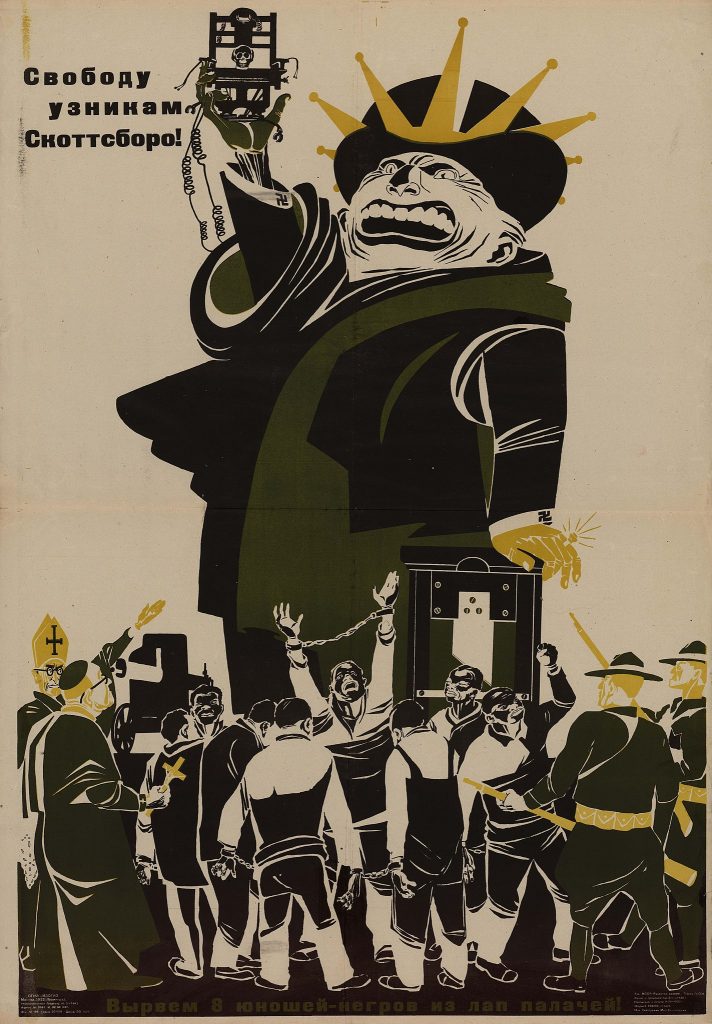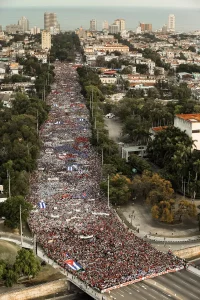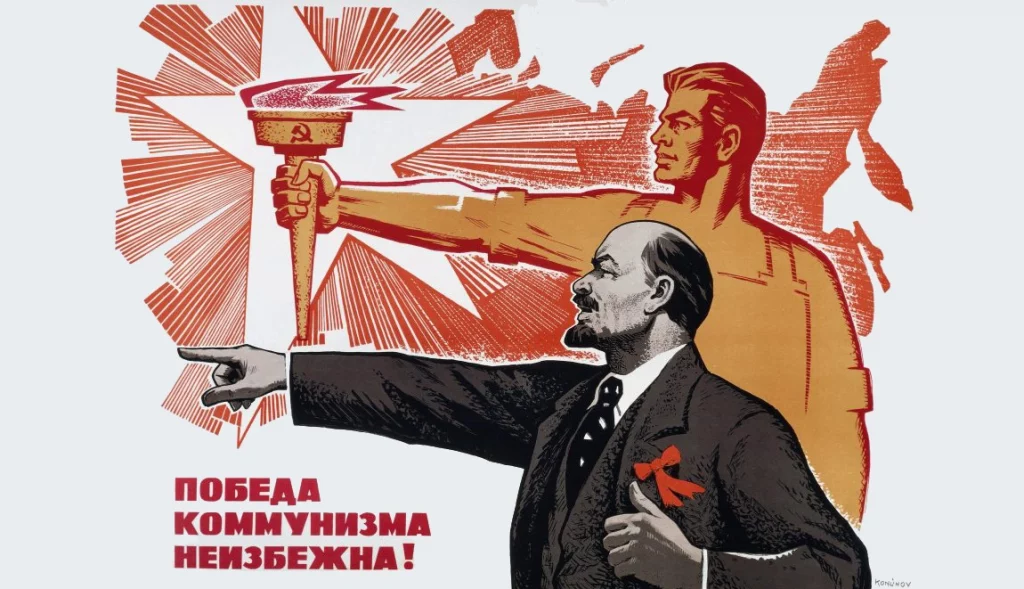
Taken from Challenge Magazine:
“Gentlemen! Do not allow yourselves to be deluded by the abstract word freedom. Whose freedom? It is not the freedom of one individual in relation to another, but the freedom of capital to crush the worker.”
These were the words of Marx in his speech “On the Question of Free Trade” when he addressed the Democratic Association of Brussels on 9 January 1848.
The concept of freedoms and rights goes back to ancient history, with the Cyrus Cylinder being argued by some to be the first charter of human rights. Although socialists have always been at the forefront of fighting for the rights of the people, we suffer from a serious image problem, especially as “[i]n Britain, it is common for people to believe that the Communists are against democracy and support a repressive political system”, as noted by YCL Chair Robin Talbot.
In my hometown of Hong Kong, people are quick to point to the erroneous theory and practice which led to Leftist errors in the mainland during the 1960s and 1970s (never mind the fact that this occurred during extremely abnormal circumstances), yet are strangely silent of the time when British colonial forces deployed helicopters from the aircraft carrier HMS Hermes to assault apartment blocks in an attempt to weed out leftists during the 1967 disturbances.
From the point of agitation, it is crucial that anti-communist slander such as the idea that human rights did not exist in the former socialist states be countered, particularly by showing concrete and tangible examples of how in actuality they did protect the rights of citizens, as well as by showing how human rights in capitalist societies ultimately overwhelmingly benefit the ruling class.

But really, what freedoms and rights are enjoyed by people living under capitalism? The Fraser Institute’s so-called Human Freedom Index, which describes itself as “the most comprehensive freedom index”, measures 82 indicators in 12 categories, these being:
- Rule of law
- Security and safety
- Movement
- Religion
- Association, assembly, and civil society
- Expression and information
- Relationships
- Size of government
- Legal system and property rights
- Sound money
- Freedom to trade internationally
- Regulation [of the market]
Furthermore, the first seven are grouped into “personal freedom” whilst the rest are grouped into “economic freedom”. Ultimately then, for all their talk of indices and statistics, in reality nearly half of what they are concerned about is property, that is to say freedoms for the bourgeoisie.
As an exercise, let us consider how capitalist states match up against certain indices, then look at how former or currently existing socialist states stand. Germany ranks number 15 on the HFI (tied with Japan and the United States), yet non-violent left-wing groups are listed under the “Left-wing extremist following”, grouping them under politically motivated crime statistics with Reichsbürgers and Islamic extremists. Additionally, the Federal Republic pays full pensions to former members of the Waffen-SS, yet only pays reduced pensions to former GDR citizens considered close to “the system”, a clear case of discrimination which stands as an affront to civil justice and the rule of law.
Looking towards Britain, Wikileaks founder Julian Assange will be extradited to the United States thanks to a decision made by British Home Secretary Priti Patel, a clear case of press jailing, harassment of journalists, and an attack on media freedom. The Metropolitan Police was sued for supposedly illegally passing on information including home addresses of Greenpeace activists to McDonalds, with the case being settled out of court with a £10,000 payment to the prosecutors, an attack on the freedom of expression. Yet the United Kingdom ranks number 14 on the HFI.
Having seen how capitalist states cannot stand up to “freedom” indicators that they themselves set, let us look at how former and currently existing socialist states stand. The German Democratic Republic, an often deeply misunderstood state slandered as the embodiment of authoritarian tyranny, would have actually fared quite well on certain indicators. Regarding the rights of transgender individuals, the government of the GDR took an essentialist view on the matter that saw it as something quantifiable, and because of that believed that just as one should accept left-handedness or hair colour, society needed to accept the fact that transsexuality existed. In fact, in its June 1990 issue, the FTM newsletter ran an article titled “Will German Reunification Hurt Transsexual Rights?”, citing the fact that the GDR’s laws provided more protection for transsexuals, including the rights to government-sponsored surgery, marriage, and adoption, than those of the FRG. This is a clearly visible example of people in a socialist state being given more opportunities to live as how they are compared with in a capitalist state.

Looking at a still-existing socialist state, let us consider Cuba. Despite the fact that the Communist Party of Cuba is the only party in the country, there are actually no restrictions on forming a political party except that counterrevolutionary activities are forbidden, so surely a plus as regards the right to form and run political parties? The National Center for Sexual Education (CENESEX) holds national conferences for Cuban Activities against Homophobia, World Sexual Health Day, No to Violence against Women and the World AIDS Day, and directs the National Commission for Integral Attention to Transsexual People, definitely contributing to the betterment of relationships considered part of personal freedoms. Additionally, similar to the GDR, Cuba accepted homosexuality as a fact of the matter and taught school children as such beginning in 1990, countering homophobic tendencies. However, ignoring the fact that the country fulfils its own freedom indicators, the Fraser Institute (perhaps tellingly) does not even include Cuba in its Human Freedom Index 2021 book (it claimed in 2018 that it could not rank Cuba due to lack of data), yet did not miss the chance to defame Comrade Comandante Fidel Castro as a “totalitarian communist dictator” when he passed away, claiming that Cuba had an “abysmal human rights record”.
So why is it that states in the capitalist sphere get a free pass, yet the international socialist community is subjected to slander and dragged through the mud by the media for a supposed lack of freedoms?
The reason for this is the nebulousness of these “freedoms”, which is summed up in the Challenge article “Unpacking neoliberalism”, in which Comrade Tom Bird explains that “Neoliberal rhetoric, like its ideological predecessor found in 19th-century classical liberalism, puts its focus on vague ideals such as ‘freedom’, ‘choice’ and ‘openness’, yet it rarely [specifies] how these ideas yield actual material benefits for the majority of people (workers) living in these societies.”
In comparison, during an interview in 1936 Joseph Stalin was able to very clearly delineate the failings of these freedoms, explaining that: “[…] we did not build this society [the Soviet Union] in order to restrict personal liberty but in order that the human individual may feel really free. We built it for the sake of real personal liberty, liberty without quotation marks. It is difficult for me to imagine what ‘personal liberty’ is enjoyed by an unemployed person, who goes about hungry, and cannot find employment.”
This sentiment was made manifest after the demise of socialism in Eastern Europe, where security and order were replaced by an orgiastic display of wanton destruction of the people’s livelihood, with barbaric capitalist criminals snapping up businesses in the deluge of privatisation whilst the people suffered job losses and deprivation.
Across the former socialist states of Eastern Europe, we have seen a constant assault on abortion rights. Whilst abortion has become a topic brought to the fore in the media again with the overruling of Roe v. Wade in the United States, it should be recognised that such regressive policies have been something of the norm in the former socialist bloc. The Federal Law “On the Fundamentals of Protecting the Health of Citizens in the Russian Federation” adopted by the State Duma on the 1 November 2011 only allows abortions up to the 12th week of pregnancy unless it is the result of rape or results in medical issues, for which abortions may be induced up until the 22nd week of pregnancy, and in Poland the restriction of abortion was seen as a symbol of the supposed “morality” of the post-socialist government. It should go without saying that such restrictions are an attack on personal liberty and a step backward from the progress made in women’s rights during the socialist era.

More recently, during the current COVID-19 pandemic Western governments have been quick to denounce China’s pandemic control measures. Yet a study from Shanghai’s Fudan University shows that if China were to drop its zero COVID strategy it could result in up to 1.6 million deaths due to the spread of the disease. Is it really in the interest of human rights to open up a country and let over a million people die so that the Global North can continue to take advantage of Chinese labour in factories that it has moved overseas to exploit low wages and allow their governments to pat themselves on the back for “reducing” emissions? And let us not forget the shamelessness of Australian news agencies essentially blaming China for not importing more lobsters during the pandemic, or when Der Spiegel thought it would be wise to publish an issue on the 1st February emblazoned with the title “Corona-Virus Made in China: Wenn die Globalisierung zur tödlichen Gefahr wird” (“Coronavirus, Made In China: When Globalisation becomes a deadly threat”). These are hardly the words of people who care about the basic rights of other humans.
Additionally, many of the achievements of socialist states do not fall under any category of “freedom” indicator used by capitalist states. Again, looking towards Cuba, let us look at advances in healthcare. The Cuban Revolution saw the total number of hospital beds increase from 25,170 in 1958 to 41,027 in 1969, or to put that into per capita terms, 3.8 hospital beds per 1,000 Cubans to 5.1. Furthermore, a study undertaken by Dr. Shirley Cereseto and Dr. Howard Waitzkin, and published by the American Journal of Public Health found that generally, socialist countries had a higher level of physical quality of life compared with capitalist states. The study covered a wide range of variables ranging from infant mortality rate, daily per capita calorie supply, and adult literacy rate. At the risk of sounding overly generalised, one could say that socialism is good for your health! But the health of the individual or overall public health is not considered a variable in deciding whether or not a country is considered “free” or not, despite the fact that a person is not free to do anything if they are bedridden (or dead).
It is easy for us to try to counter such slander by pointing out the human rights abuses that happen daily in the capitalist world at the behest of the imperialists. The horrors of the SAVAK in Pahlavi Iran, the murder of blacks and other ethnic minorities in the United States, and the racist quota-based housing policies of Denmark are but a small selection. However, we must also go further and look at how the conception of human rights in liberal democracies serves capital, and look to create a distinctly socialist theory of human rights.

In reality, much of the heavy lifting has been completed by our predecessors.
In a speech delivered to agitators of the Frankfurt (Oder) district, Heinz Geggel, then head of the Agitation Department of the Socialist Unity Party, noted that “Human rights and democracy […] are rooted in socialist ownership and power relations, in the rule of the working class and working peoples, in the social ownership of the means of production.” He further listed the rights that had been established under socialism as “the right to a job, the right to education, the right to a vacation, assured medical care and a secure old age, equality of women, the ability to work together to build society.”
Another way to consider this is that proponents of liberal democracies consider freedoms to be freedoms to do something. Ultimately, the socialist approach to human rights is that they are freedoms from something. The freedom from hunger, the freedom from ignorance, the freedom from inequality. Or, to summarise further, collective rather than individual freedoms. This is definitely not to say that individual freedom should be disregarded by socialists. However, it is only under a socialist system where exploitation has been eradicated that those individual freedoms can truly be realised.
Additionally, at a meeting of foreign ministers of the fraternal socialist states, each country put forward suggestions for counter-propaganda regarding the human rights situation, with János Berecz of Hungary suggesting the promotion of the long history of trade unionism, the development of democracy, and the resolution of conflicts with minorities, and Józef Czyrek of Poland suggesting the creation of socialist human rights heroes to add an inspirational quality.
Looking to present-day Britain, the Communist Party and the Young Communist League have addressed many of these issues in Britain’s Road to Socialism and the Youth Charter respectively. Indeed, Britain’s Road to Socialism declares that when building a socialist society “in order to defeat attempts at counter-revolution and to involve the mass of the people in socialist development, democratic rights and freedoms would need to become firmly entrenched in every aspect of economic and political life, now free from the restrictions and distortions imposed by monopoly capital.” Additionally, the YCL Youth Charter lays out clear demands for the right to work, the right to education, the right to housing, the right to freedom of movement, the right to cultural life, leisure, and recreation, the right to health, all in the framework of equal rights.
From these examples, we can construct a basis for a socialist framework of freedoms and human rights.
- Freedom from want (through a real working wage)
- Freedom from ignorance (through apprenticeships and free higher education)
- Freedom from homelessness
- Freedom from illness
- Freedom from discrimination
- Right to cultural life, leisure, and recreation
- Democratic practice and representation in the workplace (through trade unions)
- Resolution of conflicts with national minorities (as proposed through progressive federalism)
Ultimately, much of this relates to grassroots issues and issues directly relating to the people, a natural situation as communists do not take the phrase ‘Serve the People!’ as an empty slogan.
These freedoms and rights must also be expanded outside of immediately obvious cases. For instance, the right to health should also include support to the disabled to allow them to fully develop their lives, be it through improved physical access to premises, provision of guide dogs, or the development of new technologies.
However, it should go without saying that rights are not absolute. As stated in Britain’s Road to Socialism, to prevent counter-revolution “the democratically elected left government will use all the official and popular forces at its disposal to crush each and every attempt at military subversion, rebellion or invasion”, and as in Cuba antisocial behaviours that are exploitative or destructive cannot be tolerated. The resolution of such contradiction is explained by Lenin.
“From the moment all members of society, or at least the vast majority, have learned to administer the state themselves, have taken this work into their own hands, have organised control over the insignificant capitalist minority, over the gentry who wish to preserve their capitalist habits and over the workers who have been thoroughly corrupted by capitalism–from this moment the need for government of any kind begins to disappear altogether. The more complete the democracy, the nearer the moment when it becomes unnecessary. The more democratic the ‘state’ which consists of the armed workers, and which is ‘no longer a state in the proper sense of the word’, the more rapidly every form of state begins to wither away.”
V.I. Lenin, ‘State and Revolution’
Ultimately, it is the building of a society that reaches the higher phase of communist society that will truly and fully respect the freedoms and rights of everyone. In the meantime, socialists must disengage from the bourgeois conception of human rights, agitate and educate against anti-communist myths, and push forward real socialist human rights.
争取和平与社会主义!For Peace and Socialism!
Ethan Chan, is a member of the YCL’s Glasgow branch
Source: Challenge Magazine
